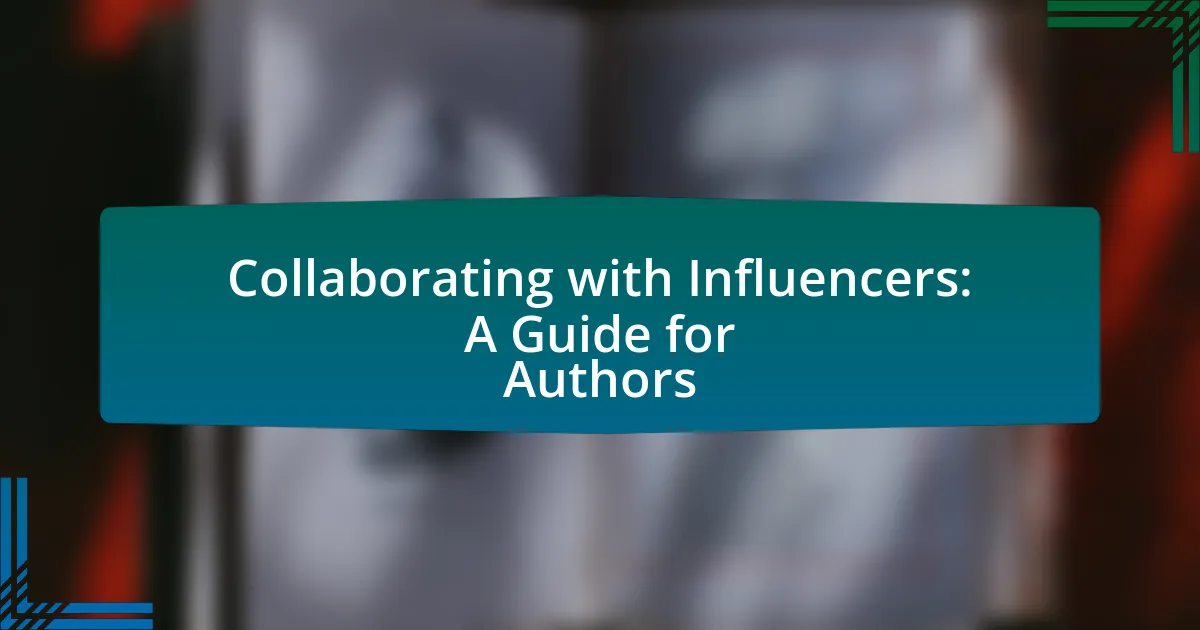Collaborating with influencers is a strategic marketing approach where authors partner with individuals who have a significant social media following to promote their books. This article outlines the benefits of such collaborations, emphasizing how authors can enhance their visibility and credibility through influencer partnerships. It discusses the types of influencers most effective for authors, strategies for identifying and approaching them, and best practices for managing these relationships. Additionally, the article highlights the importance of authenticity, legal considerations, and practical tips for successful collaborations, ultimately demonstrating how influencer marketing can significantly impact book sales and audience engagement.

What is Collaborating with Influencers?
Collaborating with influencers involves partnering with individuals who have a significant following on social media or other platforms to promote products, services, or content. This strategy leverages the influencer’s credibility and reach to engage a targeted audience effectively. Research indicates that 49% of consumers depend on influencer recommendations when making purchasing decisions, highlighting the effectiveness of this marketing approach.
How can authors benefit from influencer collaborations?
Authors can benefit from influencer collaborations by gaining access to a broader audience and enhancing their visibility. Influencers often have established trust and engagement with their followers, which can lead to increased book sales and brand awareness for authors. For instance, a study by the Digital Marketing Institute found that 49% of consumers depend on influencer recommendations when making purchasing decisions. This statistic underscores the potential impact of influencer partnerships on an author’s reach and credibility.
What types of influencers are most effective for authors?
Book bloggers and literary influencers are the most effective types of influencers for authors. These influencers have established credibility within the literary community and possess a dedicated audience that values their opinions on books. According to a study by Book Riot, 70% of readers trust recommendations from book bloggers, making them a powerful tool for authors seeking to reach potential readers. Additionally, social media influencers who specialize in book-related content, such as BookTube creators and Instagram bookstagrammers, can significantly amplify an author’s visibility, as they often engage with large, enthusiastic followings that are eager for new reading material.
How do influencer collaborations enhance book visibility?
Influencer collaborations enhance book visibility by leveraging the influencer’s established audience to reach potential readers. When authors partner with influencers who align with their book’s genre or themes, they gain access to a wider and often more engaged audience. For instance, a study by the Digital Marketing Institute found that 49% of consumers depend on influencer recommendations for their purchasing decisions, indicating that influencers can significantly impact visibility and sales. Additionally, influencers often create authentic content that resonates with their followers, further amplifying the book’s reach and credibility.
Why is influencer marketing important for authors?
Influencer marketing is important for authors because it enhances visibility and credibility, allowing them to reach a broader audience. By collaborating with influencers who have established trust with their followers, authors can effectively promote their books to targeted demographics. Research indicates that 49% of consumers depend on influencer recommendations, which can significantly drive book sales and engagement. Additionally, influencers can create authentic content that resonates with their audience, further amplifying the author’s message and increasing the likelihood of purchase.
What role do influencers play in shaping reader opinions?
Influencers play a significant role in shaping reader opinions by leveraging their credibility and reach to affect perceptions and behaviors. Their established authority in specific niches allows them to sway audience attitudes towards products, ideas, or content, often leading to increased engagement and trust among followers. Research indicates that 49% of consumers depend on influencer recommendations for their purchasing decisions, highlighting the impact influencers have on shaping opinions and driving consumer behavior.
How does influencer marketing differ from traditional marketing?
Influencer marketing differs from traditional marketing primarily in its approach to audience engagement and trust. Influencer marketing leverages the credibility and reach of individuals with established followings on social media platforms, allowing brands to connect with consumers in a more personal and relatable manner. In contrast, traditional marketing often relies on broader, less targeted advertising methods such as television commercials or print ads, which may not foster the same level of trust or direct interaction. Research indicates that 49% of consumers depend on influencer recommendations, highlighting the effectiveness of this strategy compared to traditional methods that typically see lower engagement rates.

How to Identify the Right Influencers for Your Book?
To identify the right influencers for your book, start by analyzing your target audience and the niche your book occupies. This ensures that the influencers you consider have a following that aligns with the demographics and interests of your potential readers. Utilize tools like BuzzSumo or Followerwonk to assess influencers’ engagement rates, audience demographics, and relevance to your genre. For instance, if your book is a romance novel, seek influencers who specialize in book reviews within that genre and have a proven track record of engaging their audience effectively. Research shows that 49% of consumers depend on influencer recommendations, highlighting the importance of selecting influencers who resonate with your book’s themes and target market.
What criteria should authors consider when selecting influencers?
Authors should consider the influencer’s audience alignment, engagement rate, content relevance, and authenticity when selecting influencers. Audience alignment ensures that the influencer’s followers match the author’s target demographic, which is crucial for effective outreach. Engagement rate, measured by likes, comments, and shares, indicates how actively the influencer’s audience interacts with their content, reflecting potential reach and impact. Content relevance ensures that the influencer’s themes and style resonate with the author’s message, enhancing the collaboration’s effectiveness. Authenticity, often assessed through the influencer’s transparency and genuine interactions, builds trust with the audience, making the partnership more credible. These criteria are supported by studies showing that targeted influencer marketing can yield up to 11 times higher ROI compared to traditional advertising methods.
How can authors assess an influencer’s audience engagement?
Authors can assess an influencer’s audience engagement by analyzing metrics such as likes, comments, shares, and overall interaction rates on the influencer’s posts. These metrics provide quantitative data that reflects how actively the audience engages with the content. For instance, a high number of comments relative to the number of followers indicates strong engagement, while low interaction rates may suggest a less engaged audience. Additionally, tools like social media analytics platforms can offer insights into audience demographics and engagement trends, further validating the assessment of the influencer’s effectiveness in reaching and engaging their audience.
What tools can authors use to find suitable influencers?
Authors can use tools such as BuzzSumo, Traackr, and Followerwonk to find suitable influencers. BuzzSumo allows authors to search for influencers based on content engagement metrics, helping identify those who resonate with specific topics. Traackr provides a comprehensive influencer relationship management platform that enables authors to discover and analyze influencers based on their reach and relevance. Followerwonk specializes in Twitter analytics, allowing authors to find influencers by searching bios and analyzing their followers. These tools are effective because they leverage data-driven insights to match authors with influencers who have the right audience and engagement levels for their specific needs.
How can authors approach influencers for collaboration?
Authors can approach influencers for collaboration by first researching and identifying influencers whose audience aligns with their target demographic. Once identified, authors should craft a personalized message that highlights mutual benefits, such as how the collaboration can enhance the influencer’s content while promoting the author’s work. This method is effective because personalized outreach increases the likelihood of a positive response; studies show that tailored messages can improve engagement rates by up to 50%.
What should authors include in their outreach messages?
Authors should include a clear introduction of themselves and their work in their outreach messages. This introduction should succinctly convey the purpose of the outreach, such as seeking collaboration or promoting a book. Additionally, authors should specify how the collaboration can benefit the influencer, highlighting mutual interests or audience overlap. Including relevant metrics, such as social media following or engagement rates, can strengthen the proposal. Furthermore, authors should provide a call to action, encouraging the influencer to respond or discuss potential collaboration further. This structured approach increases the likelihood of a positive response.
How can authors build a mutually beneficial relationship with influencers?
Authors can build a mutually beneficial relationship with influencers by offering value through unique content and collaboration opportunities. By providing influencers with exclusive access to their work, such as advanced copies of books or personalized content, authors can engage influencers who are interested in promoting their work. Additionally, authors should actively participate in discussions on social media platforms where influencers are present, fostering a sense of community and collaboration. Research indicates that 49% of consumers depend on influencer recommendations, highlighting the potential impact of such partnerships. This approach not only enhances the author’s visibility but also enriches the influencer’s content, creating a win-win situation for both parties.

What Strategies Can Authors Use for Effective Collaborations?
Authors can use clear communication, mutual goal setting, and leveraging each other’s strengths as strategies for effective collaborations. Clear communication ensures that all parties understand their roles, expectations, and timelines, which is crucial for maintaining a productive partnership. Mutual goal setting aligns the objectives of both authors and influencers, fostering a shared vision that enhances collaboration outcomes. Additionally, leveraging each other’s strengths allows authors to complement their skills with those of their collaborators, leading to more innovative and impactful projects. For instance, a study by the American Psychological Association highlights that effective teamwork, characterized by clear communication and defined roles, significantly improves project success rates.
How can authors create compelling content for influencers?
Authors can create compelling content for influencers by tailoring their messages to align with the influencers’ audience and brand values. This involves researching the influencer’s niche, understanding their content style, and identifying topics that resonate with their followers. For instance, a study by the Digital Marketing Institute found that 70% of consumers are more likely to engage with content that reflects their interests and values. By crafting personalized narratives, incorporating visual elements, and providing unique insights or stories, authors can enhance the appeal of their content, making it more likely to be shared by influencers.
What types of content resonate best with influencer audiences?
Influencer audiences respond best to authentic, relatable content that showcases personal experiences and storytelling. This type of content fosters a genuine connection, as studies indicate that 86% of consumers prefer authenticity in brand messaging. Additionally, visual content such as high-quality images and engaging videos significantly enhances audience engagement, with video content generating 1200% more shares than text and images combined. Therefore, content that combines authenticity with strong visual elements is most effective in resonating with influencer audiences.
How can authors leverage social media for collaboration success?
Authors can leverage social media for collaboration success by actively engaging with influencers and building relationships through consistent interaction. By following and commenting on influencers’ posts, authors can establish rapport and demonstrate genuine interest, which can lead to potential collaboration opportunities. Research indicates that 79% of marketers find influencer engagement effective for brand awareness, highlighting the importance of social media in fostering these connections. Additionally, authors can utilize platforms like Twitter and Instagram to share their work, tag influencers, and participate in relevant discussions, thereby increasing visibility and attracting collaboration offers.
What are the best practices for managing influencer partnerships?
The best practices for managing influencer partnerships include establishing clear goals, maintaining open communication, and ensuring alignment of values. Clear goals help define the purpose of the partnership, such as increasing brand awareness or driving sales. Open communication fosters trust and allows for feedback, ensuring both parties are on the same page throughout the collaboration. Alignment of values ensures that the influencer’s audience resonates with the brand, enhancing authenticity and engagement. Research indicates that partnerships with aligned values can lead to a 20% increase in engagement rates, demonstrating the effectiveness of these practices.
How can authors track the success of their collaborations?
Authors can track the success of their collaborations by analyzing key performance indicators (KPIs) such as engagement rates, sales figures, and audience reach. By monitoring metrics like social media interactions, website traffic, and conversion rates, authors can assess the impact of their collaborative efforts. For instance, a study by HubSpot found that businesses that track their marketing metrics are 1.5 times more likely to see a positive return on investment. This data-driven approach allows authors to make informed decisions about future collaborations and optimize their strategies for better outcomes.
What should authors do if a collaboration doesn’t go as planned?
Authors should communicate openly with their collaborators if a collaboration doesn’t go as planned. Effective communication allows authors to address issues directly, clarify misunderstandings, and realign goals. According to a study published in the Journal of Business Communication, clear communication significantly enhances collaboration outcomes, reducing conflicts and improving satisfaction among partners. Authors should also evaluate the reasons for the collaboration’s shortcomings, which can provide insights for future projects. By reflecting on these experiences, authors can adapt their strategies and improve their collaboration skills moving forward.
What are common pitfalls to avoid when collaborating with influencers?
Common pitfalls to avoid when collaborating with influencers include failing to establish clear goals, neglecting to research the influencer’s audience, and not maintaining open communication. Establishing clear goals ensures that both parties understand the desired outcomes, while researching the influencer’s audience helps in aligning the campaign with the right demographic. Open communication prevents misunderstandings and fosters a collaborative environment, which is crucial for successful partnerships. According to a study by Influencer Marketing Hub, 63% of marketers believe that a lack of communication is a significant barrier to successful influencer collaborations.
How can authors ensure authenticity in their collaborations?
Authors can ensure authenticity in their collaborations by establishing clear communication and aligning their values with those of their collaborators. This involves discussing goals, expectations, and creative visions upfront to create a shared understanding. Research indicates that successful collaborations often stem from mutual respect and shared objectives, which fosters genuine partnerships. For instance, a study published in the Journal of Business Research highlights that collaborations built on trust and transparency lead to more authentic outcomes, as both parties feel valued and understood.
What legal considerations should authors keep in mind?
Authors should keep copyright, contract, and liability considerations in mind when collaborating with influencers. Copyright laws protect the original works of authors, meaning they must ensure that any content shared or created with influencers does not infringe on existing copyrights. Contracts should clearly outline the terms of collaboration, including payment, deliverables, and rights to use the content produced. Additionally, authors must be aware of liability issues, such as ensuring that any claims made in promotional content are truthful and do not mislead consumers, as this could lead to legal repercussions under advertising laws.
What practical tips can authors follow for successful influencer collaborations?
Authors can achieve successful influencer collaborations by clearly defining their goals and selecting influencers whose audience aligns with their target demographic. Establishing mutual benefits is crucial; authors should offer value to influencers, such as exclusive content or promotional opportunities, which can enhance engagement. Additionally, maintaining open communication throughout the collaboration fosters trust and ensures that both parties are aligned on expectations and deliverables. Research indicates that collaborations with well-matched influencers can increase audience reach by up to 30%, demonstrating the effectiveness of strategic partnerships in expanding visibility.



